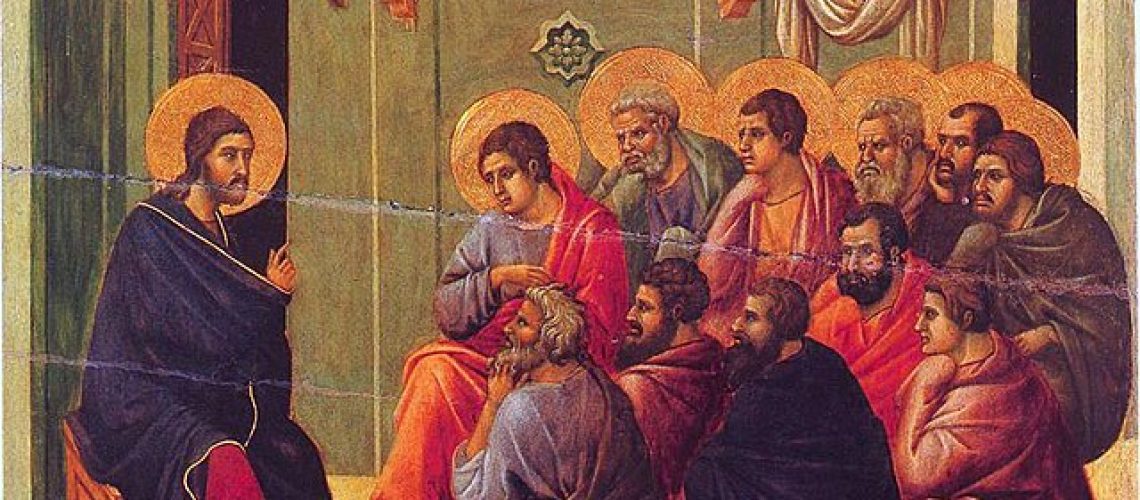The Gospel of Matthew and the Torah
The gospel of Matthew begins with the words “Book of Genealogy” (Biblos Genosis in Greek) which sound like an allusion to Genesis in the Old Testament. This sets the tone for the gospel of Matthew mirroring the Torah in many ways. Like Moses, Jesus is seen persecuted by the king since His infancy that He is Hidden by His mother. After the infancy section, Matthew organizes his gospel into five sections each consisting of narrative followed by a lengthy discourse. One can speculate that this organization into five sections is a deliberate reminder of the five books of Moses as Matthew shows Jesus to be the new deliverer of Israel who gives and renews the ancient law.
The Sermon on the Mount: A New Law
Undoubtedly, the most famous discourse of Jesus in Matthew is the Sermon on the Mount. Like Moses, Jesus ascends the mountain for the sake of the law. Unlike Moses, Jesus does not receive the law from another but rather opens His mouth and speaks as the Giver of the law. Instead of the ten commandments mostly forbidding vices, Jesus speaks nine beatitudes blessing the virtuous. He crowns them with a tenth admonition to rejoice when suffering for Jesus and the virtuous gospel He preached. With authority, Jesus uses the formula, “You have heard it say… but I tell you,” to renew and intensify some commandments for a greater spiritual purpose. It is not enough to not murder but rather one ought to aspire not to be angry without a cause.
Jesus: A Jewish Messiah
Jesus’ revolutionary sermons reinterpreting and fulfilling the commandments of the law did not avoid using the truth present in the law and rabbinical testimonies. For example, Rabbi Hillel, an infamous rabbi of Jesus’ era, said,
“That which is hateful to you, do not do to your fellow. That is the whole Torah; the rest is the explanation; go and learn.”
Rabbi Hillel
Jesus did not shy away from using his words, though rendered them in a more positive terms, as He said, “In everything do to others as you would have them do to you; for this is the law and the prophets” (Matthew 7:12). Moreover, Jesus identifies Himself with the Sabbath, the day of rest God commanded the Jews to observe, when He says,
“Come to me, all you that are weary and are carrying heavy burdens, and I will give you rest. Take my yoke upon you, and learn from me; for I am gentle and humble in heart, and you will find rest for your souls…” (Matthew 11: 28).
Jesus is our new less burdensome Sabbath in whom we find rest of body and soul.
Moses and Jesus
Jesus’ resemblance of Moses and occasionally other Jewish rabbis by no means equates him with them. Moses, the central figure of Judaism, succeeded in delivering the Israelites from Egypt and handed them down a law engraved on stones yet he failed in leading them to the promised land. As for Jesus, He delivered Israel with the rest of the human race from sin and death which reigned over them offering them a new spiritual law carved on their hearts leading them to salvation and the new heavenly Jerusalem, the true promised land, through the cross from which He reigned as “King of the Jews” (Matthew 27:37).
The Messiah is with Us… God is with Us
At the heart of the gospel of Matthew is Jesus’ being with us. In the infancy account, Jesus is called Emmanuel meaning God with us (Matthew 1:23). Immediately before His ascension, He says, “I am with you always to the end of ages” (Matthew 28:20). His being with us in the beginning of the gospel is intimately linked to a Jewish prophecy peculiar to the history of the people of Israel. But His being with us in the end of the gospel comes right after He universalizes His mission to make disciples and baptize people from all nations. Him being with you today is a matter of His promise not of your identity or righteousness.
Prayer
Lord Jesus Christ, Son of God, remind us of Your constant presence among us. Lord Jesus Christ, Son of God, aid us in appreciating the truth for what it is not for who it comes from. Lord Jesus Christ, Son of God, imprint your law in our hearts and allow us to share your gospel unto the ends of the earth. We beseech You to help us attain the sublime state your commandments lead us to that we may be made worthy of the blessing of Your beatitudes.

